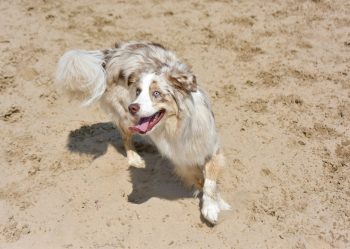The peculiar behaviour of dogs spinning before they poop has puzzled and amused pet owners for years. This ritualistic pre-elimination dance is more than just a quirky habit; it’s a complex behaviour rooted in a dog’s instinctual and environmental interactions. Delving into the reasons behind this behaviour reveals insights into canine biology, ecological sensitivity, and ancestral instincts. Understanding why dogs engage in this seemingly odd ritual before relieving themselves can enhance our comprehension of canine behaviour and how domestication has preserved specific instinctual actions. By exploring the various factors contributing to this behaviour, from territorial instincts and magnetic sensitivity to personal comfort and routine, we can appreciate the complexity of what might initially seem like a simple or humorous quirk in our canine companions.
Territorial Marking and Communication
One of the reasons dogs spin before pooping is related to territorial marking and communication. Dogs have scent glands in their anal area, and the act of defecation is one way they mark their territory, leaving behind a scent that signals their presence to other dogs. By spinning and choosing the perfect spot, dogs are not just preparing to relieve themselves but also considering the location’s strategic significance in scent marking. This behaviour is rooted in their instinct to claim territory and communicate with other dogs through olfactory cues, a fundamental aspect of canine social behaviour. The ritual of spinning and selecting an ideal spot maximizes the effectiveness of their scent marking, ensuring their message is conveyed to fellow canines that may pass by.
Magnetic Sensitivity
Research has suggested that dogs might be sensitive to the Earth’s magnetic field, and this sensitivity could influence their spinning behaviour before elimination. Studies have observed that dogs prefer to align themselves along the north-south axis when defecating. This alignment with the Earth’s magnetic field could be a way for dogs to orient themselves and find balance or comfort before pooping. The spinning behaviour may be a part of this process, as dogs seek optimal alignment with the magnetic field. This fascinating aspect of canine behaviour highlights the potential influence of natural forces on animal behaviour, suggesting that dogs have a complex relationship with their environment that affects even the most basic of actions.
Searching for Comfort and Safety
The spinning behaviour before pooping can also be attributed to a dog’s instinctual search for comfort and safety. Dogs are vulnerable while eliminating in the wild, so choosing a safe spot is crucial for their well-being. Spinning and sniffing around before pooping allows dogs to ensure that the area is secure and to prepare a comfortable place to do their business. This behaviour is a remnant of their ancestral need to be vigilant and protect themselves from predators during vulnerable moments. Even in the safety of a backyard or during a walk, domestic dogs retain this instinctual behaviour, demonstrating the deep-rooted nature of this quirky habit.
Routine and Habit Formation
For many dogs, spinning before pooping may be a matter of routine or habit formation. Dogs are creatures of habit and often perform specific behaviours ritualistically before settling down to eliminate them. This consistency in behaviour helps them feel secure and may aid in the physiological process of elimination. The spinning action could be a part of their routine, a ritual that signals to their body that it’s time to relieve themselves. This aspect of the behaviour underscores the importance of routine in a dog’s life and how specific actions become ingrained in their daily activities.
Health and Comfort Considerations
In some cases, the behavior of spinning before pooping might be influenced by health and comfort considerations. Dogs experiencing discomfort or issues related to their digestive system might engage in spinning as a way to find a position that minimizes discomfort during elimination. Similarly, older dogs or those with joint pain might spin as they seek a comfortable posture for squatting or lifting their leg. Observing this behavior, especially if it’s a new development or accompanied by signs of distress, can be a prompt for pet owners to assess their dog’s health and consult a veterinarian if necessary. This perspective on the spinning behavior underscores the importance of attentive observation to the well-being and comfort of our canine companions.
Communication with Humans
Lastly, the spinning behavior before pooping may serve as a form of communication with their human companions. Dogs are highly attuned to the reactions and responses of their owners. If a dog notices that their spinning behavior elicits attention or reaction from their owner, they may be more likely to repeat the behavior in the future. This form of communication can be a dog’s way of signaling that they are about to eliminate, ensuring they are in a suitable location or seeking approval. It’s a testament to the complex ways dogs use their behaviors to interact with and respond to their human family members, highlighting the depth of the dog-human bond and the ongoing dialogue between species.
The behaviour of dogs spinning before pooping is a multifaceted phenomenon that intertwines instinctual habits, environmental sensitivity, and personal comfort. From territorial marking and magnetic sensitivity to the search for safety and the power of routine, this quirky habit reveals much about the complex nature of canine behaviour and their interaction with the world around them. Understanding these underlying reasons enriches our perspective on our canine companions, offering insights into the instinctual and environmental factors that shape their actions. By appreciating the complexity behind this seemingly simple behaviour, we can foster a deeper connection with our pets, recognizing the intricate ways in which they navigate their lives alongside us.
The post Why Some Dogs Spin Before Pooping: Unraveling the Quirky Habit appeared first on iHeartDogs.com.

